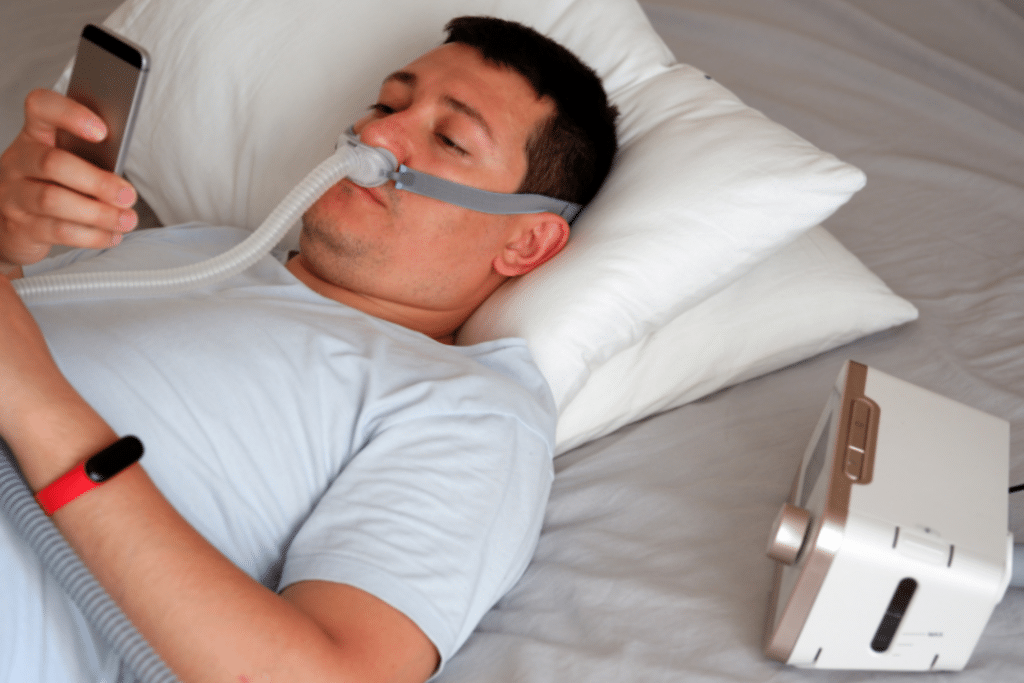When it comes to sleep apnea and asthma, the struggle to catch your breath becomes a shared experience.
Both breathing disorders involve disturbances in the respiratory system that can leave you gasping for breath and struggling to maintain healthy sleep patterns. The disruptive nature of these conditions not only interferes with the quality of your sleep but also impacts your overall well-being, making it vital to address both sleep apnea and asthma to regain control over your breathing and improve your quality of life.
But what’s the connection between the two disorders, and can you treat them together?
Before we delve into the answers, let’s take a quick look at each disorder and explore what they have in common.
What is Asthma?
Asthma is a chronic lung condition where your airways can narrow and become inflamed at times, making breathing difficult. Asthma typically begins in childhood, and affects millions of people of all ages.
Asthma exacerbation, otherwise known as asthma attacks, occur when your asthma symptoms worsen and your airways narrow. These flare-ups are caused by specific triggers, such as vigorous exercise, allergies, irritants like dust or chemical fumes, cold air, and even stress.
These attacks or bouts of symptoms are typically treated with a quick-relief, or rescue inhaler, or a nebulizer dispensing medication to re-open your airways.
Typical asthma symptoms include:
- Shortness of breath
- Chest pain, or tightness in your chest
- Coughing or wheezing
- Trouble sleeping caused by breathing difficulties, coughing, or wheezing during the night
These symptoms can be alarming and disruptive, interfering with daily activities and overall quality of life. Difficulty sleeping can be especially troublesome if you’re already dealing with a sleep disorder like insomnia or obstructive sleep apnea.
Obstructive Sleep Apnea: A Quick Recap
If you’ve been reading our blog for a while, then you’re probably familiar with obstructive sleep apnea and its symptoms. We’ll give you a quick summary of the disorder here for the sake of comparison.
Obstructive sleep apnea (OSA) is a serious sleep disorder characterized by recurrent episodes of obstructed breathing, resulting in pauses or brief cessation of airflow during the night. Hypopnea occurs when the airway is partially obstructed, while apnea refers to a complete blockage of the airway. While hypopneas are far more common and may not seem like an immediate health risk, they are actually just as serious as completely obstructed breathing and can lead to serious long term health effects.
Some symptoms of obstructive sleep apnea include:
- Anywhere between 5 to 31+ breathing interruptions per hour
- Loud snoring
- Not feeling rested, even after a full night’s sleep
- Excessive daytime sleepiness
Unfortunately, it’s difficult to know you have OSA because its most distinctive symptoms occur while you sleep. Left untreated, obstructive sleep apnea can have profound effects on your health including:
- Increased risk of heart disease and high blood pressure
- Erectile dysfunction
- Mental health problems like depression and anxiety
- Increased risk of Alzheimer’s disease
Middle-aged, overweight men are at the greatest risk for developing obstructive sleep apnea. This is why it’s often considered a “male” disorder; this isn’t the case however. Women and children can develop sleep apnea as well, and are at risk of many of the same comorbidities.
So what connects obstructive sleep apnea to asthma?
The Connection Between Sleep Apnea and Asthma
People with asthma are at higher risk of developing sleep apnea. On top of that, untreated obstructive sleep apnea can worsen your asthma symptoms by further inflaming your airways.
Patients with asthma and obstructive sleep apnea may also experience:
- More frequent asthma attacks
- Less control over asthma symptoms
- More asthma symptoms at night [1]
Both obstructive sleep apnea (OSA) and asthma can have a reciprocal negative impact on each other. Your OSA symptoms can exacerbate your asthma symptoms and vice versa. Asthma patients are also more likely to report sleep apnea symptoms like snoring, excessive daytime sleepiness, and even apnea itself. The severity of each disorder can also be worsened by health conditions like obesity, seasonal allergies, and GERD.
Although the exact connection between sleep apnea and asthma is not fully understood, experts have identified a few factors that link the two conditions.
- “Increased parasympathetic tone” during apnea episodes— causing your heart to beat more quickly as you struggle to breathe
- Constriction of your bronchiole tubes due to low blood-oxygen levels
- Abnormal hormone secretion during the night
More research is needed to really find the connection between asthma and OSA. However, the connections between the two mean that if you have asthma, especially severe asthma, then it’s important to get tested for OSA to improve your treatment options and hopefully your quality of life.
How to Treat Sleep Apnea and Relieve Asthma Symptoms
If you have asthma and are not getting the good night’s sleep you need each night, it’s vital to talk to your doctor or a sleep specialist. You may have undiagnosed obstructive sleep apnea and not even realize it!
By consulting with a healthcare professional specializing in sleep disorders, such as a sleep specialist, you can better understand your symptoms and their potential causes. They may recommend an overnight sleep study, also known as a polysomnography, to monitor your sleep patterns and identify any underlying issues closely.
During the sleep study, various aspects of your sleep will be observed, including breathing patterns, brain waves, heart rate, and oxygen levels. This comprehensive evaluation will help the specialist detect any signs of obstructive sleep apnea or other sleep disorders that may be contributing to your sleep disturbances.
Once you get a diagnosis, you can get the treatment you need to breathe better and sleep better.
The most popular and most effective treatment for OSA is continuous positive airway pressure (CPAP) therapy. CPAP therapy helps you breathe normally while you sleep by gently keeping your airways open with a continuous stream of air. While highly effective for obstructive sleep apnea, CPAP wasn’t made to treat asthma specifically like it does OSA.
However, treating your sleep apnea can help reduce the severity of your asthma symptoms. [2] Many studies have found that CPAP therapy for obstructive sleep apnea can help treat not only breathing interruptions but it can help reduce the severity of comorbidities associated with OSA, such as erectile dysfunction, high blood pressure, and hormonal imbalances.
Breathe a Sigh of Relief from Your Symptoms
Asthma and sleep apnea can both leave you breathless, but both disorders can be treated. And when it comes to CPAP therapy, one treatment can reduce the severity of both.
The exact link between the two disorders is unknown, but it is clear enough to where experts are giving it the consideration it deserves.
So if you’re struggling with asthma and getting a good night’s sleep, getting tested for sleep disorders is important. It could mean the difference between finally getting restful sleep or many more restless nights.
Don’t let undiagnosed sleep apnea leave you blue in the face. Contact the Sleep Centers of Middle Tennessee today to schedule a consultation. We can help you breathe easy and return to the healthy sleep you deserve each night.
References
- Dixit, Ramakant. “Asthma and Obstructive Sleep Apnea: More than an Association!” U.S. National Library of Medicine, Lung India : Official Organ of Indian Chest Society, 2018, www.ncbi.nlm.nih.gov/pmc/articles/PMC5946549/.
- Marcin, Ashley. “Does a CPAP Machine Help Reduce Asthma Symptoms?” Healthline, Healthline Media, 28 Apr. 2022, www.healthline.com/health/asthma/cpap-and-asthma.



